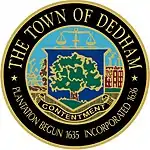Francis Chickering
Francis Chickering was an early settler of Dedham, Massachusetts who served in the Great and General Court of Massachusetts[1] and on that town's Board of Selectmen for 15 years.[2][3] He was also a teacher in the first public school in America, today well known as the Dedham Public Schools.[4]
| Part of a series on |
| Dedham, Massachusetts |
|---|
 |
| History |
| People |
|
| Places |
| Organizations |
| Businesses |
| Education |
He arrived in Dedham in 1637 from Suffolk, England with his wife, Ann, and admitted as a freeman in 1640.[1] Together they had Elizabeth in 1638, Bethia in 1640, and Mercy in 1648.[1] He was possibly the brother of Henry Chickering, with whom he served in the General Court.[1] He was a member of the Ancient and Honorable Artillery Company.[1]
Chickering was a part owner of a mill on Mother Brook, the first man made canal in America. The Town was displeased with the "insufficient performance" of the mill under Nathaniel Whiting's management[5][6] and so, in 1652, Whiting sold his mill and all his town rights to John Dwight, Chickering, Joshua Fisher, and John Morse for £250.[7] Whiting purchased it back the following year, however.[7]
Though the schoolhouse was still standing, in 1661 school was kept in Chickering's home.[4] He signed the Dedham Covenant.
References
- Whittemore, Henry (1967). Genealogical Guide to the Early Settlers of America: With a Brief History of Those of the First Generation and References to the Various Local Histories, and Other Sources of Information where Additional Data May be Found. Genealogical Publishing Com. p. 86. ISBN 978-0-8063-0378-9. Retrieved 17 November 2019.
- Worthington 1827, p. 79-81.
- Lockridge, Kenneth (1985). A New England Town. New York: W.W. Norton & Company. p. 43. ISBN 978-0-393-95459-3.
- Smith 1936, pp. 120-121.
- Hanson 1976, p. 53.
- Sconyers, Jake and Stewart, Nikki (December 18, 2017). "Episode 59: Corn, Cotton, and Condos; 378 Years on the Mother Brook". Hub History (Podcast). Retrieved December 26, 2017.CS1 maint: multiple names: authors list (link)
- Worthington 1900, p. 3.
Works cited
- Worthington, Erastus (1827). The history of Dedham: from the beginning of its settlement, in September 1635, to May 1827. Dutton and Wentworth. p. 29. Retrieved November 8, 2019.
- Hanson, Robert Brand (1976). Dedham, Massachusetts, 1635-1890. Dedham Historical Society.
- Smith, Frank (1936). A History of Dedham, Massachusetts. Transcript Press, Incorporated. Retrieved 21 July 2019.
- Worthington, Erastus (1900). Historical sketch of Mother Brook, Dedham, Mass: compiled from various records and papers, showing the diversion of a portion of the Charles River into the Neponset River and the manufactures on the stream, from 1639 to 1900. Dedham, MA: C.G. Wheeler.
- Whittemore, Henry (1967). Genealogical Guide to the Early Settlers of America: With a Brief History of Those of the First Generation and References to the Various Local Histories, and Other Sources of Information where Additional Data May be Found. Genealogical Publishing Com. ISBN 978-0-8063-0378-9. Retrieved 17 November 2019.
